The World Is Not Enough (1999)
Directed by: Michael Apted
Written by: Bruce Feirstein, Neal Purvis, Robert Wade
Starring: Denise Richards, Pierce Brosnan, Robert Carlyle, Sophie Marceau
UK
AVAILABLE ON BLU-RAY AND DVD
RUNNING TIME: 128 mins
REVIEWED BY: Dr Lenera, Official HCF Critic
007 retrieve some money for oil tycoon Robert King in Bilbao, Spain – but back at MI5 headquarters King is killed by an assassin who then blows herself up. Bond traces the money to Viktor “Renard” Zokas, a KGB agent-turned-terrorist who, after an attempt on his life by MI5, was left with a bullet in his brain which is gradually destroying his senses, making him immune to pain until he dies. At King’s funeral, Bond meets his daughter Elektra whom Reynard kidnapped but who’d managed to escape, and who is currently overseeing the construction of a new oil pipeline in Azerbaijan. M assigns Bond to protect her, and after an attempt on her life soon deduces that her head of security, Davidov, is secretly in league with Renard.…
The World Is Not Enough, whose title originates from the epitaph of Alexander the Great and is the translation of the Latin motto“Orbis non sufficit”, given to 007 when he researches his own coat of arms in On Her Majesty’s Secret Service, joins From Russia With Love [I know, I know], For Your Eyes Only and The Living Daylights as Bond films which I wasn’t too keen on at first but which have got better and better in my estimation. I distinctly recall being let down by this one’s slightly sombre feel and pacing which seems very leisurely after Goldeneye and especially Tomorrow Never Dies. But now it’s one I now feel just misses being a very good 007 film, being one of the deepest, even darkest of Bond adventures while still delivering the action, the gadgets, the laughs, the girls etc that we have come to expect. For a start it’s really well plotted with some decent turns and a story which you have to pay some attention to, and I wish so much that the fact that Elektra, quite possibly the best female character in a Bond film, was a villain had been kept a secret before release as the film doesn’t reveal this until over half way through. On the other hand, and connected with the previous sentence, this one largely botches the emotional heart of the tale which is that Bond supposedly falls in love again only to be betrayed. Pierce Brosnan and others have said that 007 loves Elektra, but it’s easy to miss this unless you really are paying attention. A real shame.
Inspired by producer Barbara Broccoli’s watching of a programme about newly discovered oil beneath the Caspian Sea, writers Neal Purvis and Robert Wade’s script then received an uncredited rewrite by Dana Stevens before Bruce Feirstein, who’d co-written the previous two films, rewrote it again. Some of Zukowsky’s dialogue came from cut lines in Goldeneye, while Renard’s pain-killing brain injury was written for Stamper in Tomorrow Never Dies. That film’s director Roger Spottiswoode, Joe Dante and Peter Jackson all turned down the job of helming this one. The first Bond film to be shot in Pinewood Studios since The Living Daylights, it was also filmed at Bilbao [Spain], London, Eilean Donan castle in Scotland, Baku in Azerbaijan, the Azerbaijan Oil Rocks, Istanbul, Turkey, and Snowdonia, Wales for some exteriors. The skiing location had to be moved due to avalanches in the French Alps, and filming in Turkey was halted due to political unrest, though a secret filming unit, comprised of twelve crew, did shoot a bit in Istanbul. When MI6 learned that they would shoot a scene around their headquarters, they moved to prohibit it, citing a security risk. However, Foreign Secretary Robin Cook, at the urging of Member of Parliament Janet Anderson, moved to overrule them and allow the shoot, stating, “After all Bond has done for Britain, it was the least we could do for Bond.” Some of the press got to see a 160 minute version that was unsurprisingly cut down greatly for theatrical release, while the opening titles were pushed back so that the pre-credits scene now included the boat chase which originally came after. It was another hit.
The opening teaser, the longest in a Bond film at 14 minutes, gives us a cracking boat chase that’s easily the best one of its kind in a 007 film, full of crowd pleasing fun like Bond’s craft [which ‘Q’ had intended to be his fishing boat for when he retired] splashing car clampers, bursting through a shed and a restaurant, jumping over other boats, driving on roads and going underwater. We’re basically in Roger Moore land, but you’ve been reading these reviews than you’ll know that I don’t see that as a problem, though it’s certainly the most light-hearted bit in the film so those who think it’s out of place may have a point. Daniel Kleinman’s titles nicely revolve around an oil theme with silhouetted women drowning in oil, women made of oil, and oil factory machinery, and the David Arnold-composed, Garbage-sung song, though melodically simple like most later Bond themes [and indeed like most recent pop songs], is pretty good, well sung and sticks in the brain. Bond is next seen in Scotland up to his usual tricks with a nurse sent to evaluate him, then we have ‘Q’ s exit which, despite the goofiness of John Cleese’s ‘R’ his replacement, is doubly poignant when you know that Desmond Llewelyn died in a car crash shortly after the film’s premiere. Bond then jets off to Azerbaijan and later boards a plane in disguise bound for a Russian missile base in Kazakhstan when he discovers that some people working for Elektra seem to be up to no good. No, glamorous this entry is not, and only one locale is really exploited: Azerbaijan’s Devil’s Breath [live flames], the place contributing moody atmosphere to Renard’s sinister first appearance.
Bond touching the computer screen showing a photo of Elektra is a touching moment and, in a film which does contain references to other Bonds but tends to make them more subtle than normal, keen eyes and ears can probably deduce that Bond falls for her because her personality and attitude to life [“there’s no point in living if you can’t feel alive”] are much like Tracy’s from On Her Majesty’s Secret Service, but one feels like much of the 32 minutes cut from the film must have been from this part of the plot because it all seems far too muted, partly though certainly not entirely due to Pierce Brosnan’s mediocre performing. Only the scene near the end when Elektra’s torturing Bond really brings it all forth properly. On the other hand there’s a bedroom scene between her and Reynard which shows the perversity of their relationship without breaching a ’12’ rating. What initially seemed like a case of Stockholm’s Syndrome, with kidnapped falling in love with her kidnapper, is revealed to be a situation in which the kidnapped is the one in control. The plotting is well handled overall, leaving the viewer unsure of who’s up to what till quite late in the day. Bond thinks he’s guarding Elektra against Reynard who steals a bomb and seems out to destroy some of Elektra’s piping which will make Azerbaijan rich again, but what he really wants to do kidnap ‘M’ and blow up Istanbul by inserting plutonium from the bomb into a submarine’s nuclear reactor, His scheme, which will drive up the price of a precious resource allowing the villains to become the wealthiest people in the world, is of course basically Goldfinger again.
There’s certainly an attempt to keep things relatively down to earth despite a few gadgets – perhaps the most notable one being the glasses that allow the wearer to see through people’s clothes. There are a few genuine laughs that don’t quite override the basic seriousness of the story, the ending heat sensor gag, a variation on the one at the end of Moonraker where ‘M’ and company clearly see what Bond and the heroine are up to, being especially chucklesome. Just before that, the final showdown in the submarine, despite it being unusual that Bond is the toughest one yet feels pain while his opponent doesn’t, oddly drags. Lengthy action scenes are fine if they maintain a high level of excitement, but this one doesn’t. Also disappointing is the attack on Zukowsky’s caviar factory by saw-wielding helicopters where it’s so obvious it was done in the studio, and really, what is Zukowsky doing in this film? – his character is largely pointless. The ski chase with paraglider-equipped snowmobiles is good though despite the biggest stunt [007 jumping onto a parachute in mid-air, then onto the ground] clearly being done in two parts, and Bond and the heroine Christmas Jones hurtling inside a pipe trying to disarm the bomb is good hair-raising stuff. The latter is generally considered to be one of the worst Bond women, especially with her Lara Croft outfit, though I think this is more down to Denise Richards’s terrible line delivery rather than the writing of the character – who says that nuclear scientists can’t be young and attractive? But of course it’s the magnificent Elektra who dominates, Sophie Marceau basically having to play several roles in the part, though even when she’s at her evilest, there’s a vulnerability to the character, while the script makes sure that her reasons for doing what she does at least make a little bit of sense.
Director Michael Apted is clearly more interested in the actors than the action, and this generally pays dividends, though Brosnan doesn’t always seem at ease with some of the lines he’s given that Roger Moore may have made something of, even groaners like “I always come prepared for a cold reception”. I don’t feel great criticising Brosnan so much in these films because I used to think he was a fine Bond, but to these [hopefully] more mature eyes he adds little to previous incarnations and is really rather wooden at times. Robert Carlyle as Renard is somehow really threatening throughout despite having little screen time, a small figure, and a bizarre ‘handicap’. Nice to see Judy Dench’s ‘M’ get to do a bit more, and I love it when she says of Bond: “He’s the best we have, though I’d never tell him of course”. David Arnold’s score is less diverse than his previous one but more organic. For once he’s able to incorporate the theme song into the score because he wrote it, though his intended end title song Only Myself To Blame, sung by Scott Walker, was replaced by an [admittedly quite awesome] techno remix of the James Bond theme. The melancholy piece serves well as Elektra’s theme in the score though. The techno-heavy action scoring [which many hate though I love] relies far too much on the first four notes of the James Bond theme, but a lovely John Barry-ish piece accompanies a skiing scene and the ending. The World Is Not Enough may not be very colourful, visually impressive [it’s quite a drab looking effort except for the lush interiors of Elektra’s house] or even very lively, but it’s a reasonable stab at a more intelligent, ‘involved’ Bond film – and just think what Daniel Craig would have done with it!

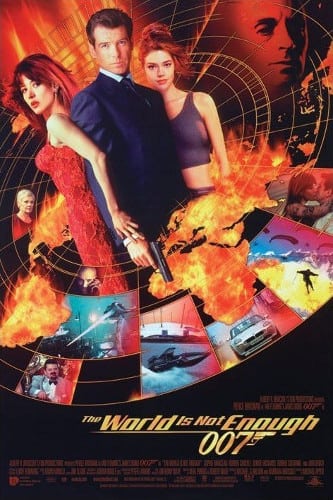
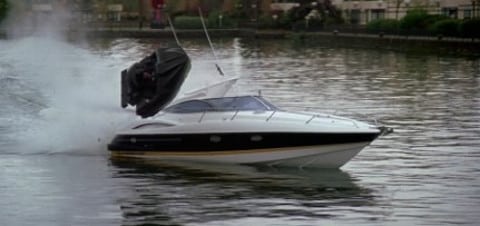
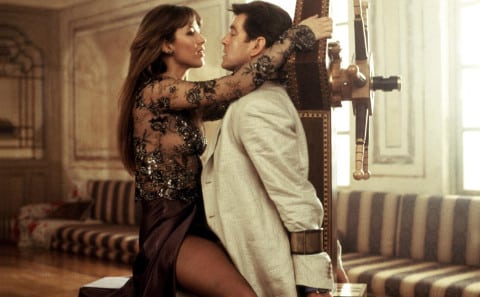




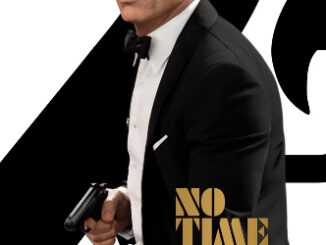
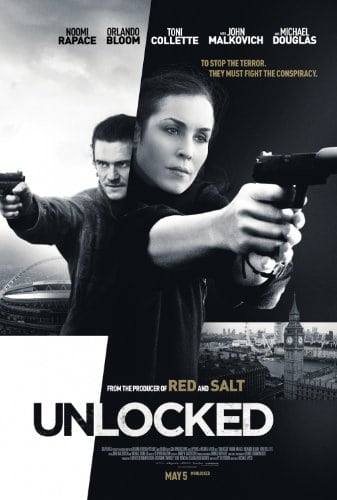

Be the first to comment